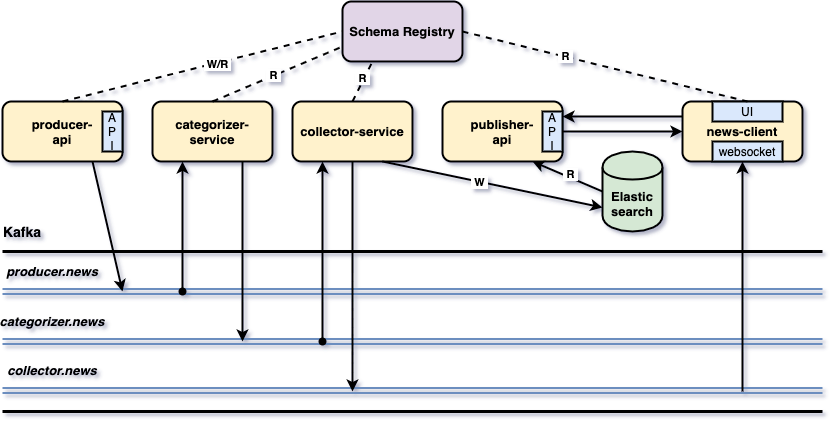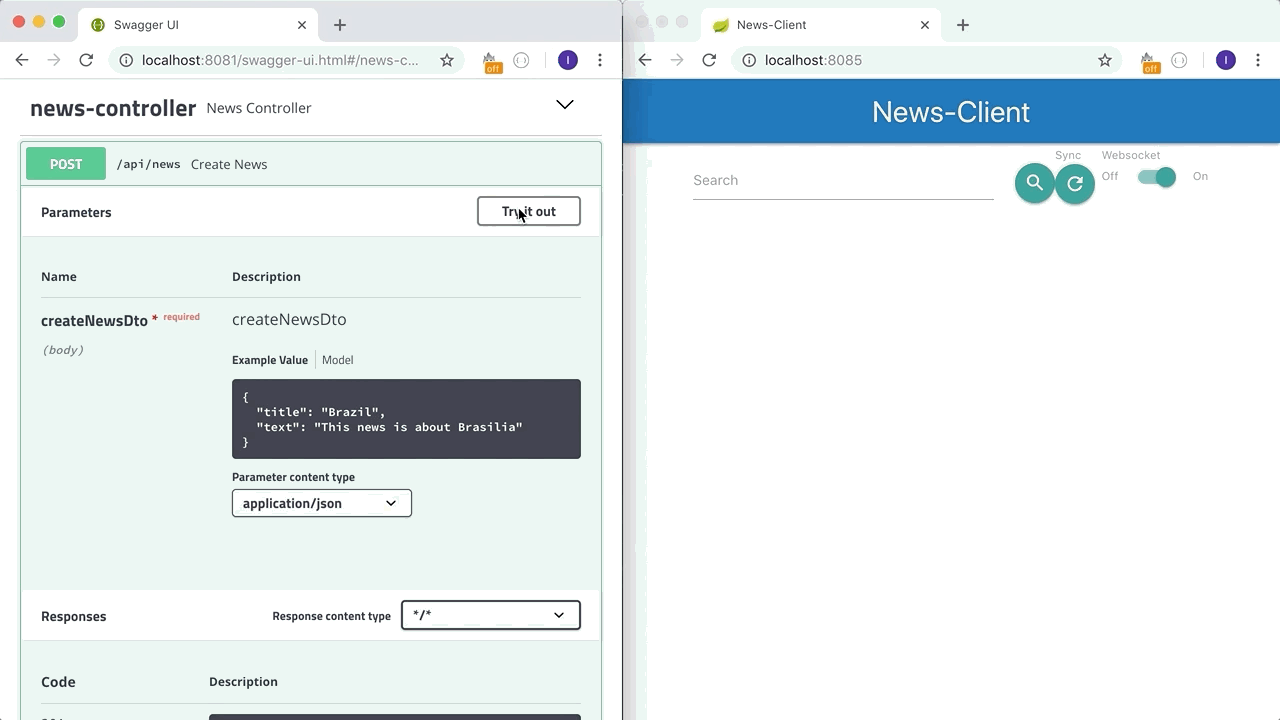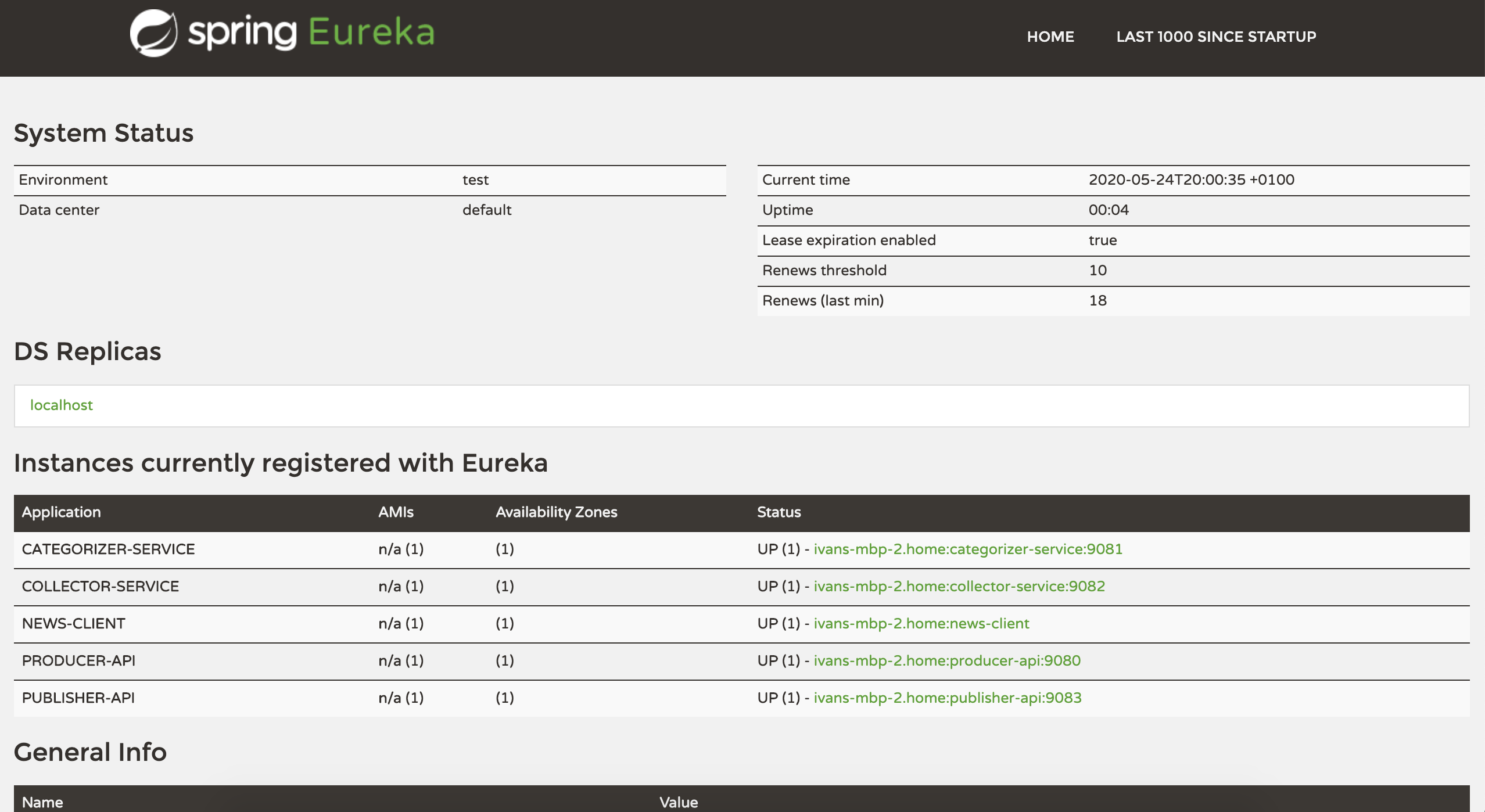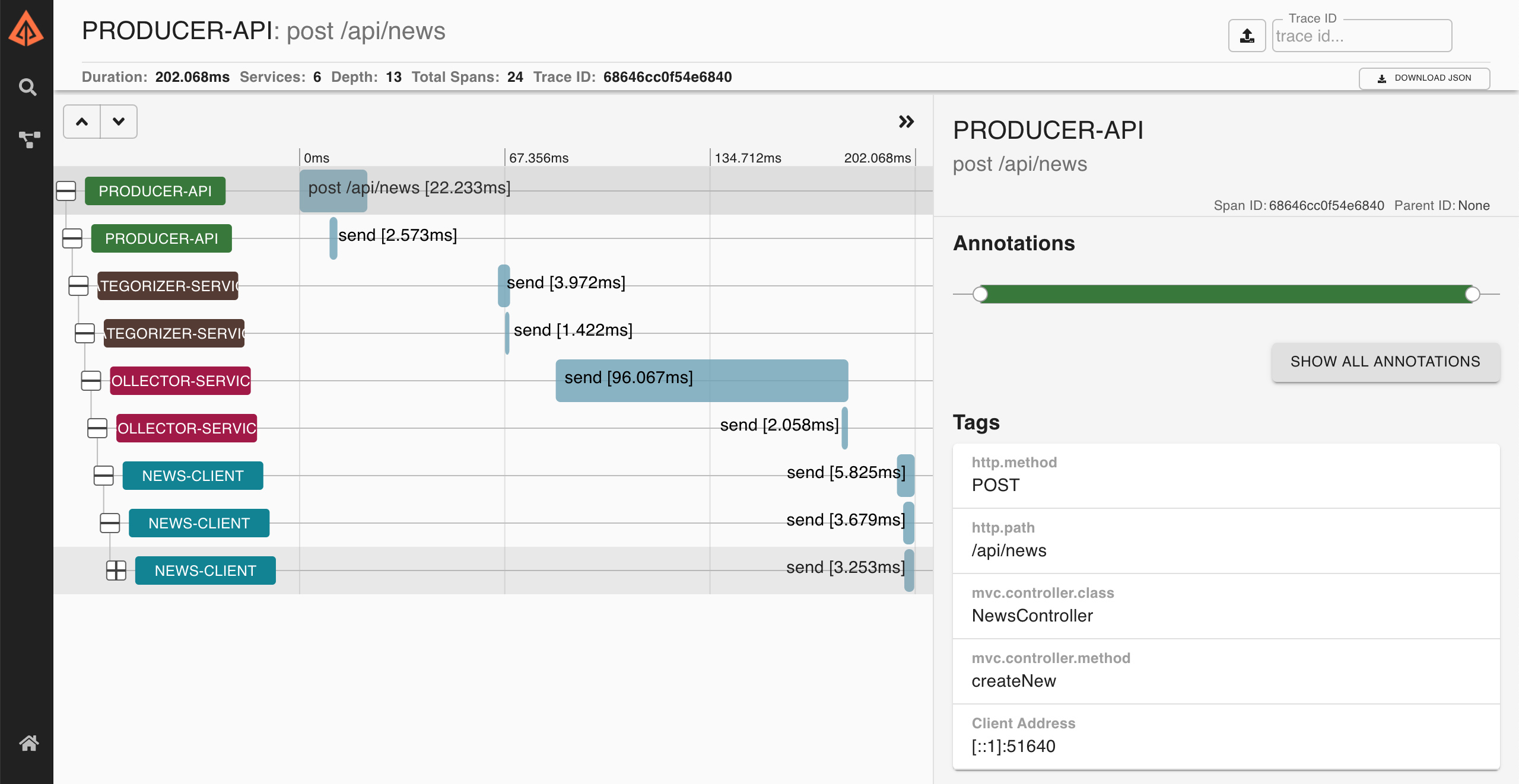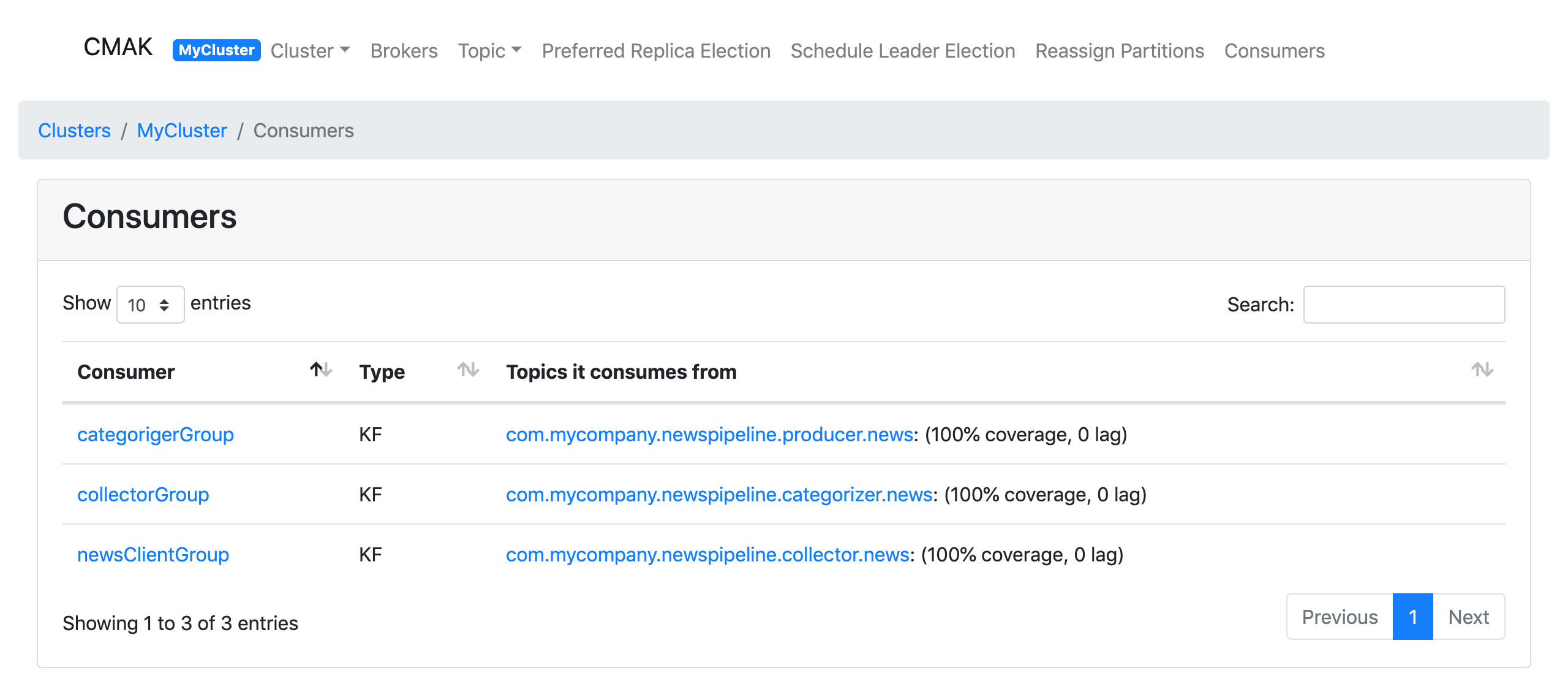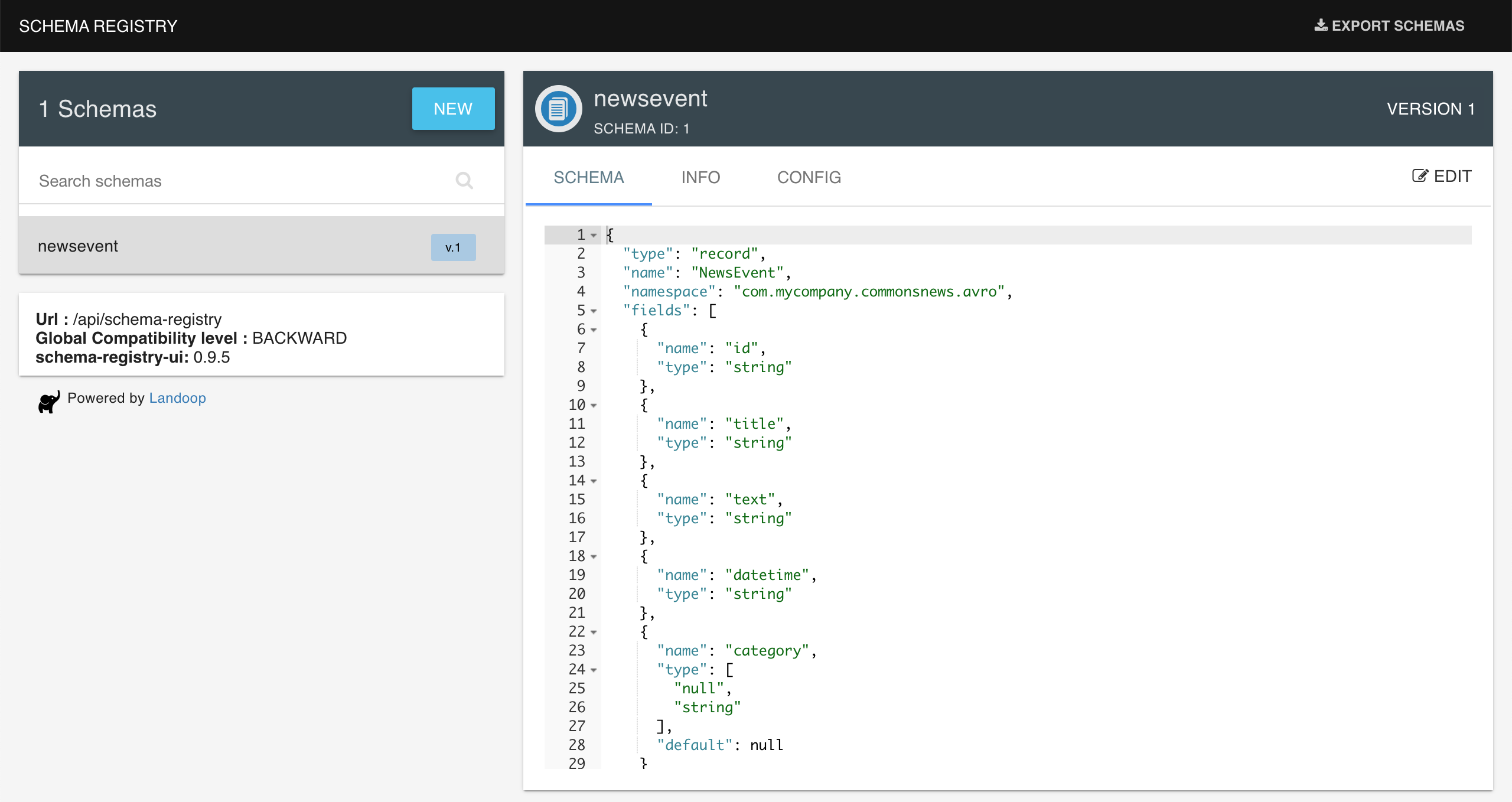The goal of this project is to implement a "News" processing pipeline composed of five Spring Boot applications: producer-api, categorizer-service, collector-service, publisher-api and news-client.
-
Spring Cloud Streamto build highly scalable event-driven applications connected with shared messaging systems; -
Spring Cloud Schema Registrythat supports schema evolution so that the data can be evolved over time; besides, it lets you store schema information in a textual format (typically JSON) and makes that information accessible to various applications that need it to receive and send data in binary format; -
Spring Data Elasticsearchto persist data inElasticsearch; -
Spring Cloud OpenFeignto write web service clients easily; -
Thymeleafas HTML template; -
Zipkinto visualize traces between and within applications; -
Eurekaas service registration and discovery.
|
Note
|
In docker-swarm-environment repository, it is shown how to deploy this project into a cluster of Docker Engines in swarm mode.
|
-
producer-api
Spring BootWeb Java application that creates news and pushes news events toproducer.newstopic inKafka. -
categorizer-service
Spring BootWeb Java application that listens to news events inproducer.newstopic inKafka, categorizes and pushes them tocategorizer.newstopic. -
collector-service
Spring BootWeb Java application that listens for news events incategorizer.newstopic inKafka, saves them inElasticsearchand pushes the news events tocollector.newstopic. -
publisher-api
Spring BootWeb Java application that reads directly fromElasticsearchand exposes a REST API. It doesn’t listen fromKafka. -
news-client
Spring BootWeb java application that provides a User Interface to see the news. It implements aWebsocketthat consumes news events from the topiccollector.news. So, news are updated on the fly on the main page. Besides,news-clientcommunicates directly withpublisher-apiwhenever search for a specific news or news update are needed.The
Websocketoperation is shown in the short gif below. A news is created inproducer-apiand, immediately, it is shown innews-client.
-
In a terminal, make sure you are in
spring-cloud-stream-elasticsearchroot folder -
Run the following command to generate
NewsEvent./mvnw clean install --projects commons-newsIt will install
commons-news-1.0.0.jarin you localMavenrepository, so that it can be visible by all services.
-
Open a terminal and inside
spring-cloud-stream-elasticsearchroot folder rundocker-compose up -d -
Wait a until all containers are Up (healthy). You can check their status by running
docker-compose ps
Inside spring-cloud-stream-elasticsearch root folder, run the following Maven commands in different terminals
-
eureka-server
./mvnw clean spring-boot:run --projects eureka-server -
producer-api
./mvnw clean spring-boot:run --projects producer-api -Dspring-boot.run.jvmArguments="-Dserver.port=9080" -
categorizer-service
./mvnw clean spring-boot:run --projects categorizer-service -Dspring-boot.run.jvmArguments="-Dserver.port=9081" -
collector-service
./mvnw clean spring-boot:run --projects collector-service -Dspring-boot.run.jvmArguments="-Dserver.port=9082" -
publisher-api
./mvnw clean spring-boot:run --projects publisher-api -Dspring-boot.run.jvmArguments="-Dserver.port=9083" -
news-client
./mvnw clean spring-boot:run --projects news-client
-
In a terminal, make sure you are in
spring-cloud-stream-elasticsearchroot folder -
In order to build the application’s docker images, run the following script
./build-apps.sh
-
producer-api
Environment Variable Description KAFKA_HOSTSpecify host of the
Kafkamessage broker to use (defaultlocalhost)KAFKA_PORTSpecify port of the
Kafkamessage broker to use (default29092)SCHEMA_REGISTRY_HOSTSpecify host of the
Schema Registryto use (defaultlocalhost)SCHEMA_REGISTRY_PORTSpecify port of the
Schema Registryto use (default8081)EUREKA_HOSTSpecify host of the
Eurekaservice discovery to use (defaultlocalhost)EUREKA_PORTSpecify port of the
Eurekaservice discovery to use (default8761)ZIPKIN_HOSTSpecify host of the
Zipkindistributed tracing system to use (defaultlocalhost)ZIPKIN_PORTSpecify port of the
Zipkindistributed tracing system to use (default9411) -
categorizer-service
Environment Variable Description KAFKA_HOSTSpecify host of the
Kafkamessage broker to use (defaultlocalhost)KAFKA_PORTSpecify port of the
Kafkamessage broker to use (default29092)SCHEMA_REGISTRY_HOSTSpecify host of the
Schema Registryto use (defaultlocalhost)SCHEMA_REGISTRY_PORTSpecify port of the
Schema Registryto use (default8081)EUREKA_HOSTSpecify host of the
Eurekaservice discovery to use (defaultlocalhost)EUREKA_PORTSpecify port of the
Eurekaservice discovery to use (default8761)ZIPKIN_HOSTSpecify host of the
Zipkindistributed tracing system to use (defaultlocalhost)ZIPKIN_PORTSpecify port of the
Zipkindistributed tracing system to use (default9411) -
collector-service
Environment Variable Description ELASTICSEARCH_HOSTSpecify host of the
Elasticsearchsearch engine to use (defaultlocalhost)ELASTICSEARCH_NODES_PORTSpecify nodes port of the
Elasticsearchsearch engine to use (default9300)ELASTICSEARCH_REST_PORTSpecify rest port of the
Elasticsearchsearch engine to use (default9200)KAFKA_HOSTSpecify host of the
Kafkamessage broker to use (defaultlocalhost)KAFKA_PORTSpecify port of the
Kafkamessage broker to use (default29092)SCHEMA_REGISTRY_HOSTSpecify host of the
Schema Registryto use (defaultlocalhost)SCHEMA_REGISTRY_PORTSpecify port of the
Schema Registryto use (default8081)EUREKA_HOSTSpecify host of the
Eurekaservice discovery to use (defaultlocalhost)EUREKA_PORTSpecify port of the
Eurekaservice discovery to use (default8761)ZIPKIN_HOSTSpecify host of the
Zipkindistributed tracing system to use (defaultlocalhost)ZIPKIN_PORTSpecify port of the
Zipkindistributed tracing system to use (default9411) -
publisher-api
Environment Variable Description ELASTICSEARCH_HOSTSpecify host of the
Elasticsearchsearch engine to use (defaultlocalhost)ELASTICSEARCH_NODES_PORTSpecify nodes port of the
Elasticsearchsearch engine to use (default9300)ELASTICSEARCH_REST_PORTSpecify rest port of the
Elasticsearchsearch engine to use (default9200)EUREKA_HOSTSpecify host of the
Eurekaservice discovery to use (defaultlocalhost)EUREKA_PORTSpecify port of the
Eurekaservice discovery to use (default8761)ZIPKIN_HOSTSpecify host of the
Zipkindistributed tracing system to use (defaultlocalhost)ZIPKIN_PORTSpecify port of the
Zipkindistributed tracing system to use (default9411) -
news-client
Environment Variable Description KAFKA_HOSTSpecify host of the
Kafkamessage broker to use (defaultlocalhost)KAFKA_PORTSpecify port of the
Kafkamessage broker to use (default29092)SCHEMA_REGISTRY_HOSTSpecify host of the
Schema Registryto use (defaultlocalhost)SCHEMA_REGISTRY_PORTSpecify port of the
Schema Registryto use (default8081)EUREKA_HOSTSpecify host of the
Eurekaservice discovery to use (defaultlocalhost)EUREKA_PORTSpecify port of the
Eurekaservice discovery to use (default8761)ZIPKIN_HOSTSpecify host of the
Zipkindistributed tracing system to use (defaultlocalhost)ZIPKIN_PORTSpecify port of the
Zipkindistributed tracing system to use (default9411)
| Application | URL |
|---|---|
producer-api |
|
publisher-api |
|
news-client |
-
Stop applications
-
If they were started with
Maven, go to the terminals where they are running and pressCtrl+C -
If they were started as a Docker container, make sure you are in
spring-cloud-stream-elasticsearchand run the script below./stop-apps.sh
-
-
Stop and remove docker-compose containers, networks and volumes
docker-compose down -v
-
Eureka
Eurekacan be accessed at http://localhost:8761 -
Kafka Topics UI
Kafka Topics UIcan be accessed at http://localhost:8085 -
Zipkin
Zipkincan be accessed at http://localhost:9411The figure below shows an example of the complete flow a news passes through. It goes since
producer-api, where the news is created, untilnews-client. -
Kafka Manager
Kafka Managercan be accessed at http://localhost:9000The figure below shows the Kafka topics consumers. As we can see, the consumers are updated as the
lagis0Configuration
-
First, you must create a new cluster. Click on
Cluster(dropdown button on the header) and then onAdd Cluster -
Type the name of your cluster in
Cluster Namefield, for example:MyCluster -
Type
zookeeper:2181inCluster Zookeeper Hostsfield -
Enable checkbox
Poll consumer information (Not recommended for large # of consumers if ZK is used for offsets tracking on older Kafka versions) -
Click on
Savebutton at the bottom of the page.
-
-
Schema Registry UI
Schema Registry UIcan be accessed at http://localhost:8001 -
Elasticsearch REST API
Check ES is up and running
curl localhost:9200Check indexes in ES
curl "localhost:9200/_cat/indices?v"Check news index mapping
curl localhost:9200/news/_mappingSimple search
curl "localhost:9200/news/_search?pretty"
-
add alias to the index: wait for this feature be available in Spring Data Elasticsearch (https://jira.spring.io/browse/DATAES-192)
-
news-client: bug. everytime sync is clicked, it enables Websocket; -
news-client: if websocket is enabled/disabled, sync button should be disabled/enabled; -
news-client: implement pagination;
